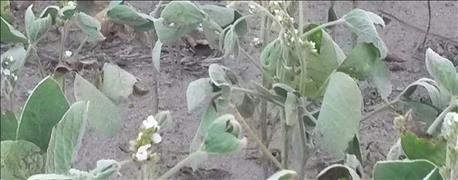
When Van Fuller stepped out of his truck to inspect his soybean fields earlier this summer, he immediately saw leaves that were cupping. "The soybeans were just not growing," the farmer from Kennett says. His fear---dicamba drift.
Related: Coalition petitions EPA to review dicamba, Monsanto responds

DAMAGE ASSESSMENT: Mike Milam, University of Missouri Extension agronomist for Dunklin County shot this photo of injured soybeans in his area. He says the drift damage is widespread throughout the region.
Surrounding all four sides of Fuller's fields was Monsanto's Bollgard II XtendFlex cotton, which was approved for planting this season. Farmers in this region of the Missouri Bootheel planted thousands of acres to both dicamba resistant cotton and soybeans. The technology allows growers to spray dicamba herbicide to control weeds, however, Missouri growers were warned that over-the-top applications of available dicamba products would not be allowed this season. Still, Fuller says, some farmers did not adhere to the warnings.
"It is hard to pinpoint who sprayed," he notes. "There was such a large amount of Xtend soybean and cotton planted in this area." What makes it difficult for this farmer is that those likely offenders are his neighbors. "It does not affect those that sprayed, they planted dicamba resistant crops, it affects me and other farmers like me, the smaller guys."
RELATED: DRIFT IS WORSE IN ARKANSAS
Illegal product use
With lower commodity prices, any damage that impacts yield affects the bottom line. "It could just put some of us out of business," Fuller added. "What makes it worse is it is illegal to spray."
The Missouri Department of Agriculture is investigating more than 100 complaints believed to be related to a herbicide use incident involving a four county area in southeast Missouri, according to Sarah Alsager, public information officers for the department. The number of acres affected at first glance is roughly 18,000, but that number could rise. "The Missouri Department of Agriculture's Bureau of Pesticide Control is on site and conducting investigations and complaints," she says.
Missouri Department of Agriculture Director Richard Fordyce warned farmers earlier this spring that it's a violation of federal law to use any dicamba product with Bollgard II XtendFlex or Roundup Ready 2 Xtend Soybeans because neither is labeled for use and any use would be against the law at this time.
Fordyce stressed that the department would impose fines on violators. "If producers are found to cause herbicide injury it can be a warning letter or there is a $1,000 penalty per violation," he said back in May. "The definition of violation, we think, would be each time you open a container, each time you go into a new field, each time you fill a sprayer." It is important for farmers affected by the drift to know that $1,000 is not the maximum fine. "It could be more," Fordyce noted.
Ongoing investigation
The department continues to investigate. "Our investigations are thorough and detailed," Alsager says. Investigators take samples from relevant areas and fields. The state's agriculture department increased manpower in the Bootheel region to handle complaints.
"Our investigators come to a conclusion," Alsager adds. "They identify where the source of the spray came from and the product. They generally find a conclusion if it was off label use or not."
About the Author(s)
You May Also Like






